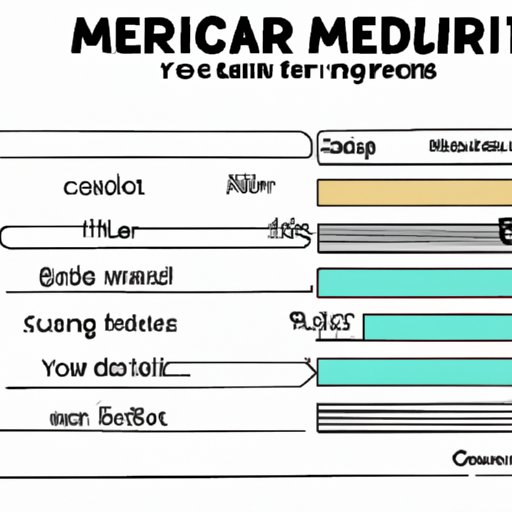
Introduction
Maintaining a healthy weight requires us to balance our energy intake with expenditure. But how many calories should you be consuming to maintain your weight? It depends on a variety of factors, including your basal metabolic rate, daily activity level, age, gender, and diet. In this article, we’ll explore how to calculate your daily caloric needs for weight maintenance and provide tips for doing so accurately and effectively.
Understanding Basal Metabolic Rate (BMR)
Basal metabolic rate (BMR) is the amount of energy your body uses to perform basic functions, such as breathing, circulation, and cell production. Knowing your BMR can help determine how many calories you need to maintain your weight.
To calculate your BMR, you’ll need to input your age, gender, height, and weight into a BMR calculator. For instance, a 30-year-old woman who weighs 140 pounds and is 5’4″ tall has a BMR of approximately 1,387 calories per day. Keep in mind, BMR varies significantly between individuals, and age, gender, height, and weight can impact it. As you age or decrease your weight, your BMR may decrease, and maintaining weight may require adjusting your caloric intake accordingly.
Factoring in Daily Activity
In addition to your BMR, your daily activity level will impact how many calories you burn each day. The more active you are, the more calories you’ll need to maintain your weight. For instance, a sedentary individual may only burn 1,500-2,000 calories per day, while a moderately active individual may burn 2,000-2,500 calories per day, and a highly active individual may burn 2,500-3,000 calories per day.
It’s important to note that activity level is subjective, and different types of activities will burn different amounts of calories. A 30-minute walk may only burn 150 calories, while 30 minutes of high-intensity interval training (HIIT) may burn up to 400 calories. You can use a calorie tracking app or consult with a professional for more accurate estimates of your activity level and corresponding caloric needs.
Using Online Calorie Calculators
If you’re unsure of your BMR or daily activity level, you can use an online calorie calculator to estimate your daily caloric needs. There are many reliable calculators available online, including the Harris-Benedict equation, Mifflin-St. Jeor equation, and Katch-McArdle formula.
To get an accurate estimate, be sure to input your correct age, gender, height, weight, and daily activity level. Keep in mind that online calculators can provide a rough estimate but may not accurately reflect your individual needs. For more precise estimations, consider consulting with a professional.
Considering Age and Gender
Age and gender can significantly influence your BMR and daily caloric needs. Women, on average, have lower BMRs than men due to lower muscle mass and higher body fat percentages. As we age, our BMR decreases, and we may require fewer calories to maintain our weight.
For instance, a 40-year-old woman may require 300-500 fewer calories per day to maintain her weight than a 25-year-old woman with the same height, weight, and activity level. It’s essential to consider your age and gender when determining your caloric needs to avoid consuming too many or too few calories.
The Role of Macronutrients
The macronutrients in our diet, protein, carbohydrates, and fat, can also affect our caloric needs. Protein and carbohydrates provide four calories per gram, while fats provide nine calories per gram.
To maintain a healthy weight, it’s essential to have a balanced intake of all three macronutrients. Protein can help you feel full, increase muscle mass, and support a healthy metabolism. Carbohydrates provide energy to your body and brain, and healthy fats are also necessary for energy, absorption of some vitamins, and hormone production.
For a 2,000-calorie diet, you may aim to consume approximately 50% of your calories from carbohydrates, 20-25% from protein, and the remaining 25-30% from healthy fats. Foods like whole grains, fruits, vegetables, lean proteins, nuts, and seeds are all good options for including in a balanced diet.
Consulting with a Professional
If you’re struggling to determine your caloric needs or aren’t sure how to balance your macronutrient intake, consider consulting with a professional. Nutritionists, dieticians, and healthcare providers can provide tailored advice and support to help you achieve your weight management goals safely and effectively.
When selecting a professional, be sure to review their qualifications and seek recommendations from friends, family, or other trusted sources. You can find licensed professionals through professional organizations, insurance providers, or health clinics.
Importance of Tracking Intake
Tracking your calorie intake, either through a journal or tracking app, can be a helpful tool for understanding your individual caloric needs. By keeping track of your caloric intake and comparing it to your BMR and daily activity level, you can determine whether you need to adjust your intake to maintain your weight.
There are many tracking apps available, including MyFitnessPal, Lose It!, and SparkPeople, which allow you to input your food intake and monitor your calorie consumption throughout the day. Be sure to track portion sizes and condiments as well, as they can add up quickly.
Conclusion
Calculating your daily caloric needs for weight maintenance requires consideration of your BMR, daily activity level, age, gender, and diet. By using online calculators, consulting with a professional, and tracking your intake, you can determine your individual caloric needs and maintain a healthy weight. Remember to keep a balance of all macronutrients in your diet, stay active, and seek professional advice as needed. Maintaining a healthy weight is an important factor in overall health and wellbeing.




